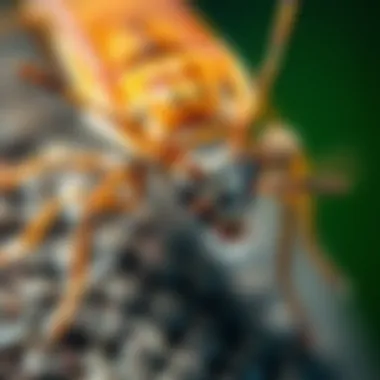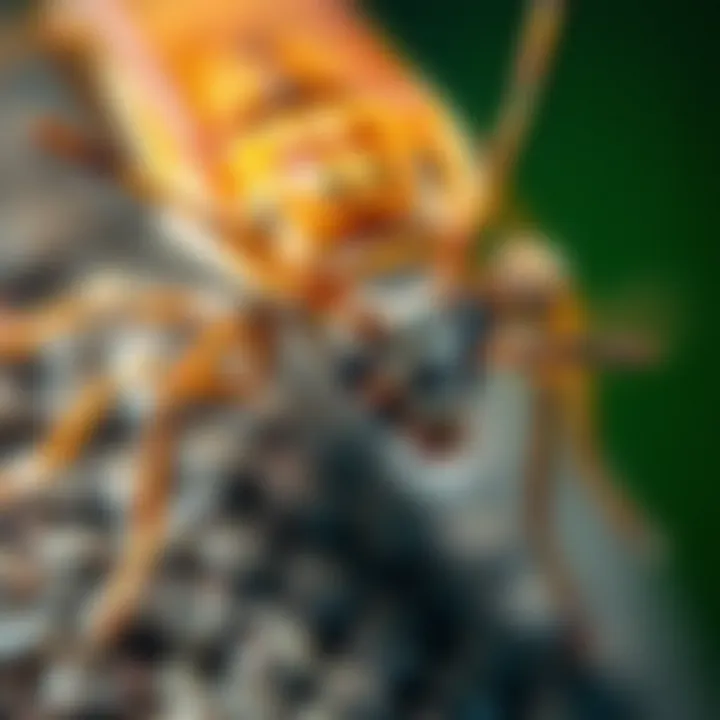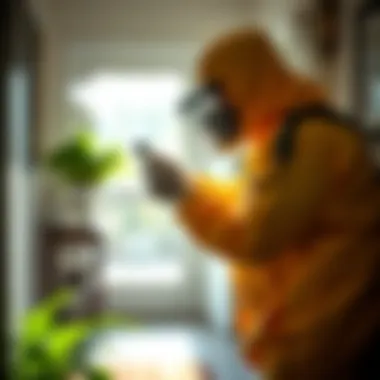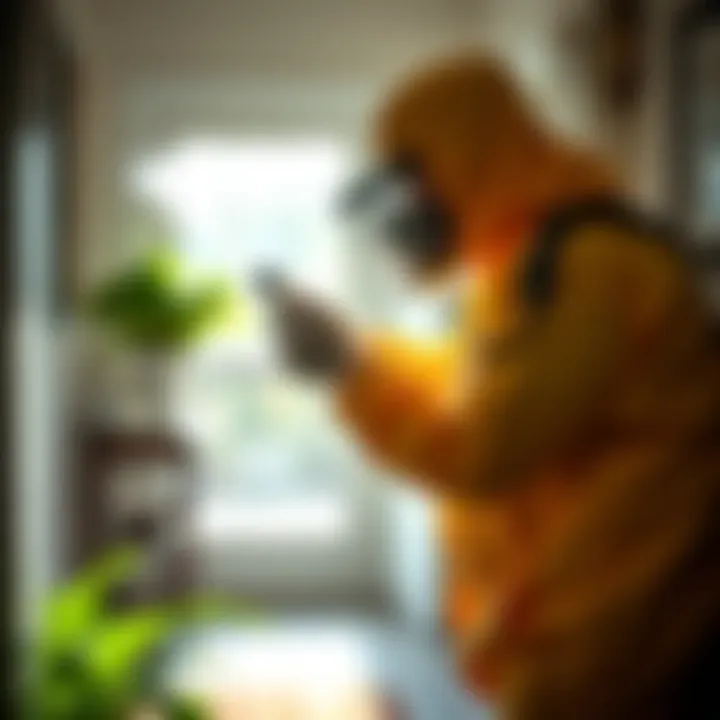Effective Pest Control Strategies in Summit, NJ


Intro
In Summit, New Jersey, the picturesque landscape can sometimes be plagued by unwelcome guests. Pest control is not just about dealing with nuisances; it's crucial for maintaining the sanctity of our homes and the health of our families. This article aims to shed light on effective pest management strategies tailored for the unique challenges faced by homeowners in this region.
Understanding pest behaviors and the signs of infestations can save your home from significant damage. With the right approach and some knowledge, managing pests efficiently becomes an achievable task.
Pest Identification
Pest identification is the first step in effective pest management. Knowing what type of pest you’re dealing with can influence how you tackle the problem and which professionals to consult.
Detailed Descriptions of Common Pests
- Termites: These wood-destroying insects can wreak havoc if left unchecked. Look for discarded wings and hollow-sounding wood within your home.
- Rodents: Mice and rats can invade homes looking for food and shelter. Signs include droppings, gnaw marks, and nests.
- Ants: Carpenter ants and other species can invade kitchens and pantries. Small trails of ants scuttling about often indicate a larger problem.
- Bed Bugs: These little critters can cause sleepless nights. Look for small, red bites on the body, alongside dark spots on bedding, which are signs of their presence.
Signs and Symptoms of Infestations
- Unusual noises at night (indicating rodents or raccoons)
- Unexplained stains or droppings in places where you store food
- Nests located in hidden corners or within walls
- Sudden increase in allergy symptoms, related to insect invasions like roaches or dust mites
Identifying these pests promptly can make a world of difference in your extermination efforts.
Prevention Strategies
An ounce of prevention is worth a pound of cure, as they say. Keeping pests at bay can save time, money, and headaches down the line.
Home Maintenance Tips for Pest Prevention
- Seal Entry Points: Cracks and gaps in walls can provide easy entry for pests. Make sure to seal them to keep critters out.
- Proper Food Storage: Always store food in airtight containers. Clean up crumbs and spills immediately, eliminating food sources for pests.
- Maintain Landscaping: Trim back bushes and trees that touch your home’s exterior. This can hinder pests from climbing onto your roof or into your home.
Natural Deterrents and Barriers
- Diatomaceous Earth: Sprinkling this powder can deter crawling insects without harming people or pets.
- Essential Oils: Oils like peppermint or tea tree oil can repel pests when mixed with water and sprayed around entry points.
With these prevention strategies in place, you’ll be one step ahead in the battle against pests.
Treatment Options
When it comes to treating a pest problem, it’s important to weigh all your options. Various methods exist, ranging from DIY remedies to professional services.
Overview of Chemical vs. Natural Treatments
- Chemical Treatments: Products containing pyrethroids can be effective, but they also carry risks for pets and children. Always read labels and follow the instructions closely.
- Natural Treatments: Many homeowners prefer using natural methods, such as vinegar or baking soda, as they pose fewer risks while still providing a degree of control.
Step-by-Step Guides for DIY Treatments
- For Ants: Mix equal parts of vinegar and water, spray the mixture around entry points, and wipe it down with cloths.
- For Bed Bugs: Wash bedding in hot water, and vacuum regularly to remove any pests.
- For Mice: Place traps at key locations, and use peanut butter as bait for the most effective results.
By understanding both prevention and treatment methods for pest control, homeowners in Summit, NJ, can safeguard their homes effectively. Investing time in pest management can lead to a pest-free sanctuary.
"An informed homeowner is the best line of defense against pests.”
For more information on specific pest control methods and other local resources, check out EPA.gov or visit local community boards on Reddit.
Preface to Pest Control in Summit, NJ
Understanding pest control within Summit, New Jersey, is crucial for homeowners who wish to safeguard their living environments. The persistent nature of pests like ants, termite, and rodents not only compromises the structural integrity of homes but also poses health risks to families. In a town where humid summers create ideal conditions for infestations, it becomes vitally important to adopt effective pest management strategies early on.
Pest Control Landscape in New Jersey
New Jersey is a melting pot of diverse ecosystems, which can be both a blessing and a curse for residents. The state's combination of urban centers and wooded areas creates ample habitats for a wide variety of pests. From the bustling streets of Summit to the quiet corners of its parks, pests are just a step away. This makes understanding local pest behavior and patterns important. For example, termites often thrive in conditions where moisture is prevalent. Thus, an annual inspection is recommended, particularly in areas where wooden structures are abundant.
Moreover, homeowners should be aware of seasonal pest cycles, which can dramatically impact infestation rates. Spring and summer can witness a spike in activity as pests emerge from winter hiding, leading to an urgent need for effective pest solutions. As the New Jersey landscape continues to change, so must the strategies used to control these unwelcome guests.
Why Professional Extermination Matters
Engaging a professional exterminator is not merely a choice; it's a necessity for many homeowners. DIY pest control can often lead to inadequate treatment and a false sense of security. Professionals bring expertise that goes beyond basic pest removal techniques. They can identify pest types, understand their behavior patterns, and recommend long-term solutions tailored to the specific problems at hand.
"A stitch in time saves nine." This old saying beautifully captures the essence of acting promptly towards pest infestations. If a small issue goes unchecked, it could spiral into a larger problem requiring extensive measures and costs.
Additionally, professional exterminators are trained in using appropriate products and techniques that ensure safety—both for the occupants and the environment. The chemicals used in pest control can be potent, and their improper application can lead to unintended health hazards. Thus, delegating this responsibility to experienced professionals can provide peace of mind. Ultimately, in a community like Summit, where pest issues can escalate rapidly, professional extermination services represent a smart investment in both property and public health.
Understanding these various aspects of pest control will equip homeowners in Summit with the insights needed to deal effectively with unwanted intruders.


Common Pests Found in Summit
Identifying the prevalent pests in Summit, New Jersey, is more than just an interesting discussion; it's a necessity for homeowners keen on safeguarding their properties. Laboring under the misconception that pests are merely a nuisance can lead to significant damage, financial loss, and even health risks. Understanding these common pests allows residents to recognize the early signs of infestations and take preventive action. Moreover, knowledge about pest behavior equips homeowners with strategies to mitigate risks, ultimately fostering a healthier living environment.
Termites: The Silent Destroyers
Termites are often called the "silent destroyers" for good reason. Though they’re rarely seen, they can cause irreparable damage before signs of their presence come to light. In Summit, these pests are particularly notorious due to the local climate, which provides a favorable environment for termite colonies to thrive.
Why Homeowners Should Care
A single colony of termites can eat through wood at an alarming rate, sometimes consuming enough to compromise the structural integrity of your home. Homeowners should remain vigilant for any signs of termites, such as:
- Hollow-sounding wood
- Mud tubes leading up to the house foundation
- Discarded wings around windows or doors
Ignoring the problem can lead to massive repair costs, often running into thousands of dollars. As Springtime leads to increased termite activity, it becomes crucial for homeowners to conduct regular inspections and consider professional extermination services.
Ants and Their Colonies
While many may overlook ants as harmless creatures, their presence should not be dismissed lightly. In Summit, species like the carpenter ant are particularly concerning due to their propensity to damage wooden structures.
Understanding Ant Behavior
Ants are social insects, meaning they thrive in colonies. This makes eradicating them quite challenging. Homeowners might find trails of ants leading into their kitchens or other spaces, often signaling an established colony nearby. Common signs of ant infestations include:
- Small piles of sawdust from nesting activities
- Visible trails of ants in and around the home
One significant reason to address ant colonies quickly is their ability to multiply rapidly. A colony that goes unchecked can increase in population swiftly, leading to more headaches down the line.
Rodents: A Growing Concern
Rodents, particularly rats and mice, are becoming a growing concern in Summit built environments. These creatures not only compromise the food safety in your home but can also introduce diseases.
The Impact of Rodent Infestations
Rodents are known for their chewing instincts, which can lead to costly damage to electrical wires and plumbing, and their droppings carry health risks. Signs of rodent infestations often include:
- Scratching noises in walls or attics
- Chewed or gnawed items around the house
- Visible droppings in food storage areas
It’s vital for homeowners to stay proactive, whether through sealing entry points or leveraging professional pest control services. Because once rodents burrow in, it can be tough to evict them without a plan.
"A stitch in time saves nine, and so does a bit of pest management. Catch the issue early!"
Identifying Pest Infestations
Recognizing the telltale signs of pest infestations is crucial for homeowners in Summit, New Jersey. An early detection can make a world of difference in managing and mitigating pest issues effectively. A stitch in time saves nine, after all. This section delves into how to spot infestations before they escalate into larger problems, discussing visual signs, behaviors of pests, and the role of technology in this diagnostic process.
Visual Signs of Infestations
Visual indicators are often the first red flags that homeowners encounter. Look for:
- Droppings: Different pests leave distinct droppings, for instance, mouse droppings are about the size of a grain of rice and are dark in color, while cockroach droppings are small and cylindrical.
- Nesting: Rodents often create nests from shredded paper, insulation, and other materials. Searching in hidden places, like attics and basements, can uncover these nests.
- Damage: Chew marks found on food packaging or furniture can signal the presence of critters. If you notice unexplained holes in your wood, your home might be inviting termites or carpenter ants.
- Unusual Smells: A musty odor might suggest a pest problem, particularly if it seems to intensify in certain areas of your home.
These signs may seem trivial, but ignoring them can turn a small issue into a bigger headache, leading to costly repairs or extensive extermination measures.
Behavioral Indicators
Besides visual cues, observing pest behaviors can also hint at an infestation. Here are a few telltale behaviors to keep an eye out for:
- Noise: Scratching or gnawing sounds during the night may indicate rodent activity. Often, they get busy when the world is quiet, so listen close.
- Activity Patterns: Ants follow specific trails to food sources. If you see a line of ants marching proudly, they’ve likely found a hidden food supply in your house.
- Unusual Pet Behavior: If pets act unusually, like behaving nervously or trying to play with empty spaces, they might be sensing pests that we can't see.
Being attentive to these signs requires a keen eye but can be instrumental in heading off a full-blown infestation before it wreaks havoc.
Using Technology for Pest Identification
The modern world offers tools that can simplify the process of pest identification.
- Mobile Apps: Various apps allow users to take pictures of pests to identify them using image recognition. For instance, apps like Seek by iNaturalist can assist in determining whether a bug is a friend or foe.
- Digital Monitoring Devices: Some homeowners invest in smart traps that send alerts when pests are detected. This is particularly useful for continuous monitoring of high-risk areas.
- Online Forums and Resources: Communities like Reddit or dedicated pest control forums can be invaluable for sharing experiences and tips. Homeowners can post pictures and receive real-time advice from others who may have faced similar challenges.
Harnessing technology not only streamlines pest identification but can enhance your overall pest control strategy.
Early detection of pest issues can save time and money, making it essential for every homeowner to be aware of the potential indicators of infestations.
Spotting pests early can turn what could be a pest-laden nightmare into a minor inconvenience. Educating yourself on these indicators will not only empower you but could very well keep your home pest-free.


Prevention Strategies for Homeowners
Keeping pests at bay isn't just about what happens when an infestation shows up; it's about being ahead of the game. The significance of prevention strategies lies in their ability to help homeowners avoid costly damages and maintain a healthy living environment. Implementing proactive measures can save time, money, and a lot of headaches down the road. Identifying possible entry points, practicing good hygiene, and executing simple landscaping tasks can keep unwelcome guests from overstaying their welcome.
Maintaining Home Hygiene
The first line of defense against pests is often cleanliness. A tidy home not only keeps a pleasant atmosphere but discourages many common pests. Here are some important hygiene habits to form:
- Regular Cleaning: Frequently vacuuming and dusting can help remove crumbs and other food remnants that attract ants, roaches, and more.
- Washing Dishes Promptly: Do not allow dirty dishes to pile up. Food residue is a magnet for pests.
- Trash Management: Seal garbage in containers with tight-fitting lids. Empty them regularly to avoid attracting flies or rodents.
By integrating these cleaning habits into daily routines, homeowners can significantly lessen the chances of a pest invasion.
"An ounce of prevention is worth a pound of cure." Maintaining home cleanliness is simple yet effective in keeping pests at bay.
Pest-Proofing Your Property
Once you've maintained hygiene, pest-proofing your property comes next. This might sound daunting, but it’s simple to execute with a few adjustments. Consider these steps for pest-proofing:
- Seal Cracks and Gaps: Inspect porches, windows, and doors for any gaps. Caulking and weather stripping can go a long way in blocking entry points.
- Secure Vents and Pipes: Ensure that vents aren’t only functional but also sealed against pests. A little mesh can do wonders.
- Maintain Good Drainage: Standing water is a haven for mosquitoes. Ensure that gutters are clear and that storm drains work effectively.
Implementing these measures can deter pests from entering uninvited. A well-sealed home serves as a fortress against many common pests.
Landscaping Considerations
Lastly, the landscaping around a home can be an inviting or uninviting place for pests. Thoughtful landscaping can either attract or deter insects and vermin. Here are some landscaping strategies to consider:
- Keep Plants Trimmed: Overgrown vegetation can serve as a bridge for pests. Be sure to trim back bushes and shrubs away from the house.
- Use Appropriate Mulch: Organic mulch can harbor insects. Opt for rubber or gravel mulch, as these varieties do not promote insect habitation.
- Eliminate Standing Water: Remove plant pots, old tires, or any items where water can accumulate, as these spots can become breeding grounds for mosquitoes.
By taking into consideration the layout and upkeep of the landscape, homeowners can further minimize their pest problems. Effective landscaping not only beautifies the property but also enhances pest prevention efforts.
Choosing the Right Exterminator
Choosing an exterminator is an important step that can greatly influence the outcome of your pest control efforts. In Summit, NJ, where various pests are a common concern, selecting the right professional is essential for effective and safe extermination. A skilled exterminator not only understands the pests prevalent in your area, but also employs techniques that won't compromise your home, family, or the environment. This section delineates crucial elements to consider, helping homeowners make an informed decision.
Qualifications to Look For
When evaluating exterminators, it’s vital to gauge their qualifications. Certifications can vary by state, but hiring someone who is licensed to practice in New Jersey is non-negotiable. A certified exterminator should possess knowledge of local pest behavior and the latest treatment methods. Expect to see credentials like:
- Pest Control Technician License: Required by the state to operate legally.
- Specialized Training: Look for experts in specific pest types, such as termites or rodents.
- Insurance: Liability insurance protects you and your property in case of accidents.
Above all, a good exterminator should be willing to provide documentation of these credentials upon request. Remember, if they’re reluctant to share this information, it’s a red flag.
Evaluating Customer Reviews
Customer reviews serve as a window into the reliability and effectiveness of an exterminator's services. In this digital age, many homeowners turn to platforms like Yelp or Google Reviews, where they can find first-hand accounts from prior clients. Here are some points to consider while scouring reviews:
- Consistent Positive Feedback: Look for patterns in the feedback. If multiple clients mention the same traits or services positively, that’s a solid indicator that the exterminator might be trustworthy.
- Response to Complaints: How does the exterminator handle dissatisfaction? A professional should address negative reviews constructively and demonstrate a commitment to customer satisfaction.
- Detailed Experiences: Reviews that elaborate on the specific situation and the outcomes can provide valuable insights into what you can expect.
Customer reviews can offer a reality check beyond just the sales pitch, so don’t overlook this step.
Understanding Pricing Structures
Costs can vary dramatically among exterminators, leading many homeowners to prioritize budget over quality. It’s wise to look beyond mere pricing to understand what each quote includes.
- Initial Inspection Fees: Some exterminators may charge for an initial assessment, while others include it in the service cost. Make sure you know what to expect.
- Service Plans: Many exterminators offer ongoing maintenance plans. Determine whether the long-term service costs align with your expectations and needs.
- Hidden Costs: Always clarify if there are potential additional fees for extra treatments or unexpected pest emergencies. A transparent pricing structure shows professionalism and builds trust.
Treatment Options Offered by Exterminators
Having a solid grasp of the treatment options available through pest control experts in Summit, NJ, is crucial for homeowners looking to tackle infestations head-on. The various methods not only differ in effectiveness but also impact the environment and overall health of your household. Understanding these options allows property owners to make informed decisions, thereby enhancing the efficacy of pest control efforts and ensuring a healthy living environment.
Chemical Treatments Explained
Chemical treatments have long been the go-to for pest control professionals. These options typically involve the use of pesticides formulated to eliminate specific types of pests. Here’s what you should keep in mind:
- Types of Chemicals: The main types include insecticides, which target insects, and rodenticides, useful for rodents. Each category offers products that can be highly effective when applied correctly.
- Effectiveness: Often, these treatments provide rapid results; you may notice a marked decline in pest activities within a short time. However, effectiveness may vary by pest type and environmental conditions.
- Safety Concerns: Homeowners often worry about the impact of chemicals on children and pets. It's essential to discuss safety protocols with your exterminator, including any required waiting periods before reoccupying treated areas.
"Understanding the ins and outs of chemical treatments can make a world of difference in managing your pest problems effectively and safely."
Natural Pest Control Solutions
With the rise in eco-consciousness, many homeowners in Summit are seeking natural pest control solutions. These alternatives focus on using organic materials and methods that are less harmful to the environment. Here’s why natural options can be enticing:


- Eco-Friendly: By opting for natural treatments, you contribute to a healthier ecosystem. Products made from plant-based or mineral-derived compounds often break down more quickly and do not linger in the environment.
- Health Benefits: Many natural solutions are inherently safer for all family members. Essential oils, diatomaceous earth, and garlic are examples of substances commonly utilized in this area.
- Effectiveness: While often slower to act, natural solutions can lead to long-term control. They work by creating an inhospitable environment for pests, rather than just killing them outright. This might include blocking entry points or disrupting their reproductive cycles.
Integrated Pest Management Approach
Integrated Pest Management (IPM) takes a holistic approach to pest control, combining various strategies for an effective solution. IPM is not just about eliminating pests but also understanding them and addressing the root of the problem.
- Monitoring and Identification: IPM begins with thoroughly assessing pest populations and understanding their behavior. Monitoring helps in identifying what pests are present and when they are most active.
- Preventive Measures: By focusing on exclusion techniques—like sealing cracks or reducing clutter—homeowners can effectively deter pests from invading.
- Combination of Solutions: IPM often incorporates chemical, biological, and cultural control methods. For instance, beneficial insects may be introduced to combat pest populations while at the same time using minimal chemical treatments as a backup, should populations surge unexpectedly.
Being knowledgeable about these diverse treatment options is pivotal. Homeowners can take a proactive role in safeguarding their homes by working with qualified exterminators who can tailor strategies to their specific needs. This understanding fosters more effective pest control, ensuring both short-term relief and long-term prevention.
Legal and Ethical Considerations
Navigating the world of pest control in Summit, NJ, requires attention to both legal and ethical aspects. Understanding these considerations is vital for homeowners who want to ensure that their pest management practices are responsible and compliant with state regulations. Let’s take a closer look at how these components shape effective pest control strategies.
Understanding State Regulations
In New Jersey, pest control is governed by a series of regulations that ensure safety both for the public and the environment. Homeowners should be aware that application of pesticides must adhere to guidelines set forth by the New Jersey Department of Environmental Protection (NJDEP). These regulations stipulate who can apply pesticides, which products can be used, and how these substances should be applied to minimize risks associated with exposure.
For example, many pesticides are classified and regulated based on their potential impact on health and the environment. It’s essential that exterminators are licensed and follow the best practices outlined in these regulations. Homeowners can verify an exterminator’s credentials through NJDEP's resources, ensuring they choose a compliant and knowledgeable professional.
Moreover, understanding these laws not only protects your home but also promotes the welfare of the community. One must remember that improper use of pest control substances can lead to more than just personal risk; they can impact local ecosystems, drinking water sources, and even lead to significant legal consequences for non-compliance.
Ethics in Pest Control Practices
Ethical pest control transcends mere compliance with the law. It involves prioritizing the well-being of both people and the environment while employing effective extermination methods. Ethical exterminators focus on integrated pest management (IPM) techniques, which emphasize prevention and the use of non-toxic solutions whenever possible.
When selecting an exterminator, homeowners should inquire about their practices, particularly in terms of how they handle chemicals and the measures they take to protect non-target species, including pets and wildlife. Here are a few ethical considerations that should guide pest control efforts:
- Transparency: Trusted exterminators will explain their methods and the products they use. They should provide homeowners with clear information about potential risks and benefits associated with treatments.
- Sustainable Practices: Utilizing eco-friendly products or natural pest control methods demonstrates a commitment to sustainability. These solutions are often just as effective without the heavy environmental footprint.
- Community Health: Consider choosing companies that are involved in community education about pest control. Initiatives that promote awareness and prevention can enhance the overall quality of life in Summit.
"An ethical approach to pest control is not just about solving a problem; it’s about fostering a healthier environment for all."
Focusing on sustainable and ethical practices not only mitigates health risks but strengthens trust in the pest control industry. Homeowners are empowered to take an active role in their pest management strategies while respecting the legal frameworks that protect their community and environment. By being informed, residents of Summit can contribute to a culture of responsible and ethical pest control.
Myths and Misconceptions About Pest Control
Understanding myths and misconceptions about pest control is crucial for homeowners in Summit, New Jersey. The terrain and climate can lead to various pest-related challenges, making it imperative to dispel common fallacies. Misinformation can cause people to underestimate the severity of infestations, leading to inadequate pest management strategies and potential damage to their properties. Moreover, recognizing the truth behind pest behaviors can help in effectively mitigating pests in a manner that is safe for families and the environment.
Dispelling Common Myths
Many homeowners fall prey to various myths regarding pests. Let’s take a closer look at some of these and the facts that counter them:
- Myth 1: A clean house doesn't have pests. While cleanliness can reduce the likelihood of an infestation, it's not a foolproof shield. Pests can enter through tiny cracks, be transported unknowingly on belongings, or find shelter in places you might not regularly clean, like basements or attics.
- Myth 2: All pesticides are dangerous. Not all pest control products are created equal. Many modern treatments are designed with safety in mind. There are options available that pose minimal risk to humans and pets, showing that it’s possible to be effective and safe at the same time.
- Myth 3: DIY solutions are always sufficient. While some minor pest problems might be managed with home remedies, persistent infestations often require professional expertise. Relying solely on over-the-counter products can lead to ineffective treatments and wasted resources.
Professional exterminators often possess knowledge and tools that are beyond DIY solutions. They can offer tailored pest control plans and help prevent future infestations.
- Myth 4: Pest control is only needed in summer. Many home and garden pests thrive year-round. Rodents, for instance, often seek shelter inside homes as temperatures drop. Believing pest control is a seasonal task can leave your home vulnerable—month after month.
Understanding Pest Behavior
To effectively handle pest infestations, it is essential to understand common pest behaviors. Here are a few key insights:
- Territorial instincts: Many pests, like ants, are territorial. They will defend their space fiercely. This means if you see a few of them, it’s likely only a fraction of what’s actually there. Understanding this can urge you not to delay in seeking help.
- Hibernation patterns: Knowing when pests go into hiding can help in planning spraying or treatment cycles. Many insect pests will lie low during colder months but become active again in the spring, emerging along with warmer weather.
- Foraging habits: Rodents can memorize routes, which means if you notice droppings or gnawed items, they’re likely using the same pathways. Identifying these can aid exterminators in planning effective control strategies.
In summary, separating fact from fiction and understanding pest behavior can greatly aid homeowners in preventing infestations. This foresight encourages proactivity and effective engagement with pest control professionals, ultimately leading to healthier living spaces in Summit, New Jersey.
End: Empowering Homeowners
In the realm of pest control, knowledge is power. The conclusion of this article serves as a rallying cry for homeowners in Summit, NJ, equipping them with essential insights and strategies to combat pest infestations. By understanding the importance of proactive measures, homeowners can transform their spaces into pest-resistant havens. The significance of being informed about local pest challenges cannot be overstated; it equips individuals with the tools they need to defend their homes effectively.
Encouraging Proactive Measures
Adopting a proactive stance against pests can save homeowners a heap of stress and financial burden in the long run. Simple practices such as sealing entry points, keeping food stored properly, and regular inspections of the property can make a world of difference. It’s not just about fighting pests once they show up, but minimizing their chances of ever stepping foot inside your home. Here are some practical tips on encouraging homeowners to take action:
- Regular Property Inspections: Homeowners should schedule regular check-ups, ideally seasonally, to monitor for any signs of pests.
- Education on Local Species: Knowledge about common pests such as termites, ants, and rodents should empower homeowners to identify potential threats.
- Utilize Professional Services: Don’t hesitate to call in expert help. Regular treatments from licensed exterminators can keep homes pest-free.
Being proactive provides more than just a feeling of security; it's an investment in the health and well-being of the family.
The Future of Pest Control in Summit
As we look ahead, the future of pest control in Summit appears to be leaning heavily towards innovation and sustainability. Advancements in technology, such as bio-based treatments and smart monitoring systems, promise a more efficient way to battle infestations. Integrated pest management is gaining steam, emphasizing sustainable practices that minimize environmental impact while effectively managing pests.
Moreover, as more homeowners step into the realm of DIY pest control, it becomes vital to strike a balance between home remedies and professional techniques. Here are some evolving trends:
- Smart Pest Monitoring: The utilization of sensors and smart devices to track pest activity in real-time is on the rise, offering homeowners a heads-up before an infestation spirals out of control.
- Eco-Friendly Treatments: With a growing consciousness towards eco-friendliness, many exterminators are turning to natural pest control solutions, providing safer alternatives for homes with children and pets.
- Community Awareness Programs: Local governments and organizations are increasingly focusing on educating the public about pest control strategies tailored to their specific regional challenges.
"It's always better to stay ahead of the game rather than play catch-up. Knowledge, in the end, saves time, money, and homes."
By continuing to educate and involve themselves in the pest control dialogue, homeowners can protect their investments and foster a healthier community.



